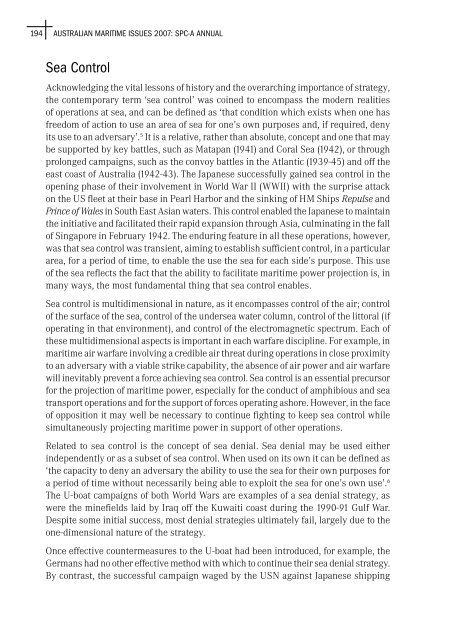Australian Maritime Issues 2007 - Royal Australian Navy
Australian Maritime Issues 2007 - Royal Australian Navy
Australian Maritime Issues 2007 - Royal Australian Navy
You also want an ePaper? Increase the reach of your titles
YUMPU automatically turns print PDFs into web optimized ePapers that Google loves.
194 AUSTRALIAN MARITIME ISSUES <strong>2007</strong>: SPC-A ANNUAL<br />
Sea Control<br />
Acknowledging the vital lessons of history and the overarching importance of strategy,<br />
the contemporary term ‘sea control’ was coined to encompass the modern realities<br />
of operations at sea, and can be defined as ‘that condition which exists when one has<br />
freedom of action to use an area of sea for one’s own purposes and, if required, deny<br />
its use to an adversary’. 5 It is a relative, rather than absolute, concept and one that may<br />
be supported by key battles, such as Matapan (1941) and Coral Sea (1942), or through<br />
prolonged campaigns, such as the convoy battles in the Atlantic (1939-45) and off the<br />
east coast of Australia (1942-43). The Japanese successfully gained sea control in the<br />
opening phase of their involvement in World War II (WWII) with the surprise attack<br />
on the US fleet at their base in Pearl Harbor and the sinking of HM Ships Repulse and<br />
Prince of Wales in South East Asian waters. This control enabled the Japanese to maintain<br />
the initiative and facilitated their rapid expansion through Asia, culminating in the fall<br />
of Singapore in February 1942. The enduring feature in all these operations, however,<br />
was that sea control was transient, aiming to establish sufficient control, in a particular<br />
area, for a period of time, to enable the use the sea for each side’s purpose. This use<br />
of the sea reflects the fact that the ability to facilitate maritime power projection is, in<br />
many ways, the most fundamental thing that sea control enables.<br />
Sea control is multidimensional in nature, as it encompasses control of the air; control<br />
of the surface of the sea, control of the undersea water column, control of the littoral (if<br />
operating in that environment), and control of the electromagnetic spectrum. Each of<br />
these multidimensional aspects is important in each warfare discipline. For example, in<br />
maritime air warfare involving a credible air threat during operations in close proximity<br />
to an adversary with a viable strike capability, the absence of air power and air warfare<br />
will inevitably prevent a force achieving sea control. Sea control is an essential precursor<br />
for the projection of maritime power, especially for the conduct of amphibious and sea<br />
transport operations and for the support of forces operating ashore. However, in the face<br />
of opposition it may well be necessary to continue fighting to keep sea control while<br />
simultaneously projecting maritime power in support of other operations.<br />
Related to sea control is the concept of sea denial. Sea denial may be used either<br />
independently or as a subset of sea control. When used on its own it can be defined as<br />
‘the capacity to deny an adversary the ability to use the sea for their own purposes for<br />
a period of time without necessarily being able to exploit the sea for one’s own use’. 6<br />
The U-boat campaigns of both World Wars are examples of a sea denial strategy, as<br />
were the minefields laid by Iraq off the Kuwaiti coast during the 1990-91 Gulf War.<br />
Despite some initial success, most denial strategies ultimately fail, largely due to the<br />
one-dimensional nature of the strategy.<br />
Once effective countermeasures to the U-boat had been introduced, for example, the<br />
Germans had no other effective method with which to continue their sea denial strategy.<br />
By contrast, the successful campaign waged by the USN against Japanese shipping
















